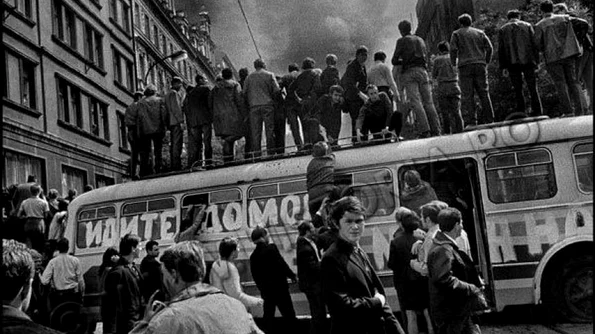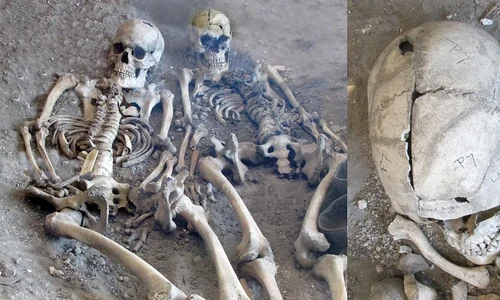
The Communism in Prague: Between Legitimacy and Stalinism
Czechoslovakia was the only sovietized Eastern European country where the Communist Party initially enjoyed a certain level of legitimacy. However, this legitimacy was lost because of the brutal sovietization of 1950s and it was regained by Dubček’s reformist movement. Yet, the new Communist leadership would re-impose a closed off, reactionary regime which proved resistant to reformation.
During the interwar period, Czechoslovakia was known as the most democratic Central and Eastern European state as well as the only country where the Communist Party was not legally abolished. Moreover, this party was considered “important, legal, respectable and native” since it had been always voted by more than 10% of the electorate, therefore it participated by democratic means in the political life of the country. The Nazi administration formally banned the Communist Party in 1938, however, it retained its credibility during and after the WW2.
J.F.Brown explains the causes of the special post war status of the Communist Party:the Nazi occupation;the disillusionment with the West because of the Munich Agreement (USSR did not directly take part in it, however, it ultimately agreed with what Hitler, Mussolini, Chamberlain and Daladier decided);USSR’s post war prestige (which had not been tainted by the Red Army’s brutal occupation as in the other countries) and last but not least, the influence of the pan-Slavist movement over the Czechs and Slovaks and the lack of Russophobic sentiment present in countries such as Romania or Poland.
The London-exiled president Edvard Beneš and Stalin agreed during the war that the Communists would participate in the post war government of Czechoslovakia. Beneš rightly foresaw the post war political future and consequently, invited the Communists to be part of his exiled government. Moreover, at the end of 1943, he signed a Special Treaty of Friendship, Post War Cooperation and Mutual Aid with the Soviet Union. Beneš explained and justified the signing of the document this way:“Thus, the Red Army is the one which will free my country of the Germans. Consequently, I have to be in accord with Stalin, in order to establish my administration. I have just done that under circumstances which do not mean relinquishing Czechoslovakia’s independence.”
The first post war general elections were legitimately won by the Communist Party. Thus, Czechoslovakia was the only country where the Communists rose to power democratically without Soviet intervention. The Party’s credibility was maintained by the fact that it implemented a very moderate policy in the first years after 1945. However, this was the result of Stalin’s desire to make of Czechoslovakia an example of cooperation between a Communist Party and other political parties, therefore, it was not the natural choice of the Czechoslovakian Communists. Unlike the situation in Romania or Poland where the Soviet Union brutally imposed a Communist regime, Moscow refrained from exerting the same pressures on Prague.
Sovietization of Czechoslovakia
However, everything changed in 1947. During the summer, the USSR pressured Prague like all of the other countries in its sphere of influence to relinquish the American financial aid of the Marshall Plan. Moreover, in September, the Czechoslovakian Communists were admonished at the first Kominform conference, because of their moderate type of government and because they did not solve the “problem of power.”
Therefore, in the last months of 1947 and the first months of 1948, the Czechoslovakian Communists had begun to force their way to power. On February 21st, 1948, the 12 ministers representing the democratic parties resigned so as to press for the fall of the Gottwald government. At the same time, the Communists organized a series of demonstrations, strikes and protests, in order to over-emphasize the political crisis. Because of the crisis escalation, Beneš accepted the ministers’ resignations and approved of the formation of a new Gottwald government with a Communist majority. Thus, February 25th, 1948 is considered the official date of the regime change in Czechoslovakia. The Communist ascension to power had been formally legal, however, it was facilitated by the fact that the Communist Party controlled the Police and Army almost completely.
After February 25th, the Communists took to eliminating the anti-Communist press and to purging the universities, sports clubs, professional organisations, military and civil services. In April, the Czechoslovakian government nationalized the companies which exceeded 50 employees and the other industries which were unaffected by the 1945 nationalizations. Also, the government changed the Constitution (which Beneš refused to sanction), started the collectivization of the agriculture and in 1949, began implementing the first five-year plan.
Historians observed that after the February 1948 coup, the Communist Party of Czechoslovakia transformed itself from the most moderate into the most radical Eastern European Communist Party. Thus, they became known, because of their “combination of repression, rigidity, xenophobia and ferocity of the domestic purges.”
The Humane Socialism Crushed by the Soviet Tanks
Only after 1960 did the KSČ begin to transform, because of Khrushchev’s destalinization. Although it was initially encouraged by the USSR, the reformist movement inside the KSČ would lead to one of the greatest crisis of Communism. In January 1968, the inflexible Secretary General Antonín Novotný was replaced by the Slovak Alexander Dubček who promised the following:“by the Communist party’s initiative, the political renovation of the country and the revitalization of its economy;winning public trust in the reality of reformation by implementing it systematically as well as operational emancipation of the state and liberating its social institutions from the hard party regulations;and the avoidance to violate the Soviet permissiveness boundaries established in 1956. ”
Dubček’s vision of a “humane socialism” enjoyed a wide popular support, especially because of the promise to eliminate censorship as well as to re-establish the liberty of speech. However, Dubček’s fast-paced course of reformation alerted the Soviets who feared that Czechoslovakia’s “humane socialism” endangered the whole Socialist system and also, affected USSR’s strategic interests. Thus, the Prague Spring ended up with the same fate as the Hungarian Revolution of 1956:during the night of 20th-21stAugust 1968, the armed forces of the Warsaw Pact (USSR, Poland, Bulgaria and Hungary) invaded Czechoslovakia and proceeded to end Dubček’s liberalization course. The invasion of Czechoslovakia was justified by the Brejnev Doctrine (or the Doctrine of Limited Sovereignty) and it became the crossroads event for the global Communism, therefore proving yet another time since November 4th, 1956 that the independence of the Socialist countries was a utopia.
However, the repression which followed the Soviet invasion of 1968 was not as tough as the one in Hungary after 1956. Dubček was replaced in April 1969 by Gustav Husák, a reactionary Communist who thought that USSR’s invasion had been justified and he would ensure that the ideals of the Prague Spring would be suppressed.















